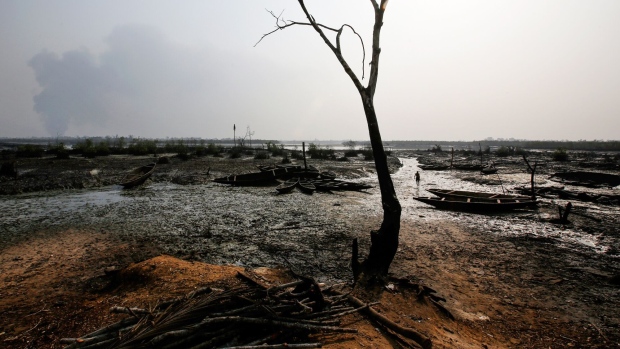Mar 8, 2024
Nigerian Oil-Producing Region Eyes Carbon Deals From Mangroves
, Bloomberg News

(Bloomberg) -- An oil-rich Nigerian state has granted a UK-based company the rights to develop projects on about 9% of its land to generate carbon credits by restoring degraded mangroves.
Delta State, at the heart of Nigeria’s crude-producing Niger Delta region, signed a memorandum of understanding with Serendib Capital last week to lease land for 30 years, renewable for another 30 years, to restore the mangroves and seagrass beds.
The project could potentially sequester, or store away, 5.32 million tons of carbon each year, prevent the deforestation of 250,000 hectares and replant 20,000 hectares, according to the project developer.
Oil majors such as Royal Dutch Shell Plc, Eni SpA, Chevron Corp., TotalEnergies SE and ExxonMobil Corp. have been blamed for much of the damage that’s historically destroyed the area’s wetlands and farms. They, in turn, could now become some of the biggest buyers of carbon offsets.
“With this kind of arrangements, some of the oil companies will hopefully see this as a vehicle through which they can restore the environment,” said Delta State’s commissioner of economic planning, Sonny Ekedayen.
Foreign companies have been drawn to forest-based offset projects in Africa because they offer a potentially easy way to cancel out their homegrown, hard-to-abate greenhouse gas emissions. But the market has cooled recently amid increasingly sharp criticism from scientists and experts.
“Forest-related carbon credits have been subject to scrutiny over the past 18 months, especially mangrove credits,” said Serendib Capital Chief Executive Officer Rafat Ali Rizvi. “That’s why we were very clear to meet the highest requirements.”
The developer is targeting certification from the offset registry Verra and aims to keep 45% of the revenue, with 55% going to Delta State and the communities.
Mangrove restoration is the most common type of “blue carbon” project that companies are buying to offset their emissions. The term refers to projects that sequester carbon in marine ecosystems.
Blue carbon projects are typically more valuable than those from most other sectors because of their high carbon dioxide absorption capacity. In addition to the mangroves, the Delta State project also proposes to restore the seagrass bed, which also absorbs CO2.
But Nnimmo Bassey, director of Health of Mother Earth Foundation said that polluters should take direct responsibility to “clean up their mess.”
“We know that the mangrove system of the Niger Delta have been destroyed mainly by the activities of oil companies,” said Bassey. “The government is always looking for ways for oil companies to win.”
Read more: Dubai Firm’s Africa Ambitions Raises Carbon Colonialism Concerns
Oil and gas is the mainstay of the Nigerian economy, providing of 90% of its foreign-exchange earnings. Most of it is pumped from the Niger Delta, a region that’s also home to some of the world’s largest mangroves. Some studies suggest that the Niger Delta has lost as much as 40% of its mangroves since oil production began in the 1950s.
Still, there is consensus about the urgency of cleaning up the mangroves, and other initiatives have failed so far.
Even in parts of the Niger Delta where production has stopped, oil has continued to leak from wellheads and pipelines. Every year, Nigeria’s oil spill detection and response agency records several hundreds of spillage incidents in the Niger Delta, soaking the soil and seeping into creeks. At 41 years old, life expectancy in the Niger Delta is ten years less than the national average.
The project will require at least two rounds of consultations with local communities. That will allow the developer and their partners, including the Foundation for Partnership Initiatives in the Niger Delta, or PIND, to assess their needs.
Changing behaviors like tree-chopping for timber will require providing more economical alternatives, said Effiong Essien, the director of programs at PIND. “When people stop cutting the wood, that will be a major milestone,” he said.
©2024 Bloomberg L.P.






